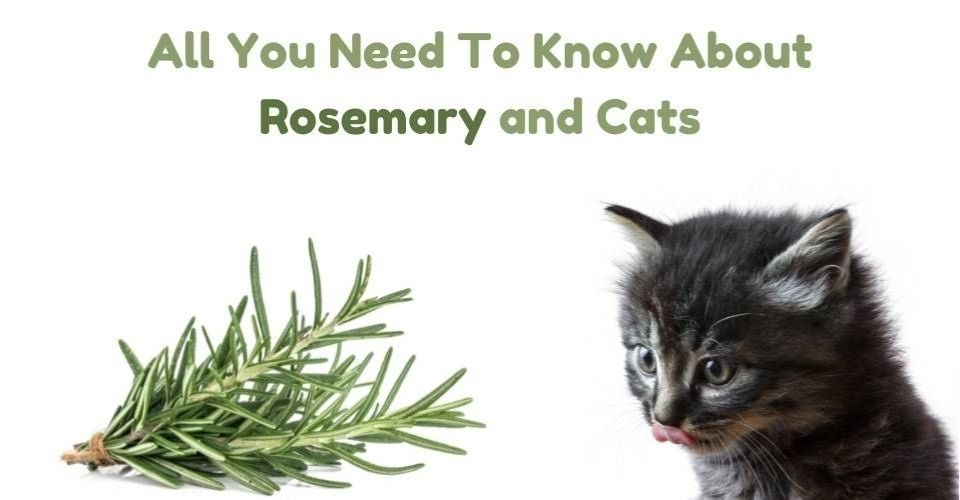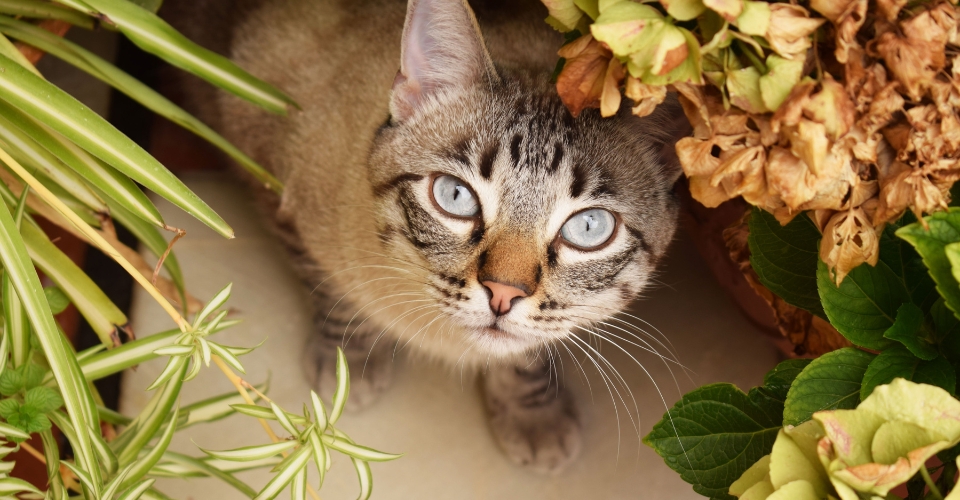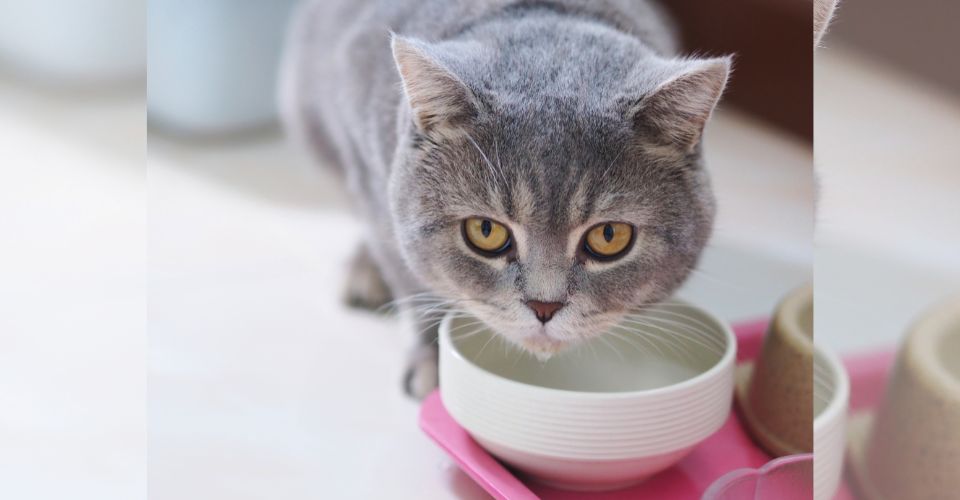Originating from the Mediterranean region, rosemary is a culinary herb, having many medicinal benefits. It is widely used for garnishing and adding a woodsy and citrusy taste to numerous recipes, such as steaks, soups, etc. You probably have been using it too. If you are a cat keeper, at one point, you may have thought, is rosemary safe for cats. Or, is rosemary toxic to cats? Can you sprinkle some rosemary on your cat’s meal?
Are You Thinking of Sharing Rosemary With Your Cat?
Are you cooking your cat some dinner? Are you tempted to sprinkle some rosemary on your cat’s chicken? Or, maybe you are thinking of growing rosemary in your garden. But you are not sure if rosemary is good for cats. This uncertainty is the reason that responsible cat owners, though contritely, refuse to give their fluff balls any rosemary even if they keep meowing and begging the whole time when they are chopping rosemary on the kitchen table.
Well, it’s good that you are playing it safe. It is no secret that human dietary needs are very different from cats, and this is the reason that many human foods can be deadly for cats, such as onion, garlic, chocolate, etc. Therefore, before offering human foods to your cat, you should make sure it is safe for cats or not.
Is Rosemary Safe for Cats?
Did you just catch your cat taking a bite of rosemary in your garden? Distressed, you might wonder if it is safe for cats to have rosemary.
Well, there is nothing to worry about if your cat has taken a small bite. According to the American Society for the Prevention of Cruelty to Animals (ASPCA), rosemary is not toxic to cats as well as dogs and horses. In fact, it is the other way round—rosemary has some considerable health benefits for cats.
Health Benefits of Rosemary for Cats
Numerous herbs are deadly poisonous for pets—their one bite can prove deadly for your cat. This is why it is wrongly believed that all herbs are dangerous for cats. It is not true. You will be surprised to know how beneficial, both medicinally and nutritionally, could some herbs could be for your fluff ball. Rosemary is one of those beneficial herbs for cats.
Rosemary is loaded with useful antioxidants that can have impressive effects on your cat’s health. There is rosmanol to help your cat fight cancer and ensure speedy recovery in case of an injury. Another great antioxidant present in rosemary is carnosic acid, which protects the brain from oxidative free radical damage. It also helps your pet with weight loss by breaking down the body fat.
Where ursolic acid helps cats with their muscle growth, caffeic acid helps them relax by reducing their fatigue, thereby helping them stay agile. And camphor found in rosemary can help your cat keep fungal infections at bay.
Is Rosemary Oil Safe for Cats?
On top of all the medicinal benefits, rosemary oil is an excellent pest repellent.
While in concentrated form, rosemary is not good for cats. But in the diluted form, it can be tremendously useful as an ointment and for flea and ticks management.
If you think your cat has ticks or fleas that have been annoying her for a while now, you can bathe your cat with a diluted solution of rosemary oil to rid her of the ticks and keep fleas at a distance.
To make the diluted solution, you can add some rosemary oil to a bucket of warm water.
If your cat seems afraid of water, giving her a bath might be challenging, but a guide to bathe a kitten can smooth things out for you.
Can Kittens Eat Rosemary?
Knowing that cats can safely consume rosemary, you might consider it safe for your kittens as well. Well, it is not. Vets strongly advise keeping your kittens away from rosemary herbs. The reason being their fragile, not yet fully developed, stomachs. Baby kittens also lack the necessary enzymes required for the digestion of the fibrous content of the rosemary.
It is advised that you only give your kittens their kitten food to meet the nutritional requirements of your baby kitten. Moreover, giving them human foods like rosemary would only spoil the young kitten.
My Cat Never Eats Rosemary
Rosemary has a very strong and powerful taste. This is the reason that most cats do not take more than a bite or two of a rosemary herb. While it is a blessing in disguise for many cat owners as they do not have to worry about their cats consuming an excessive amount of rosemary which could be dangerous. However, for others, it is a headache as their cats would do not even taste it.
Considering the medicinal benefits, many times, vets suggest cat owners feed some rosemary to their cats. In such conditions, a cat not eating rosemary could be a headache.
Are you mad at your cat? Well, do not get mad at your kitty.
It is not your kitty, it’s the strong taste of rosemary.
If you want your cat to have some rosemary, you should sprinkle some on the next meal you cook for her. Feeding traces of rosemary at first is the key. It develops her taste for it.
When your cat starts eating rosemary, you should never let her eat too much of it as it could have consequences.
When Is Rosemary Bad For Cats?
Knowing that rosemary is excluded from the list of toxic herbs for cats, you must be eager to add it to your cat’s diet, considering its potential health and medicinal benefits for felines.
Beware! While cats can safely eat rosemary, you should never forget that cats are obligate carnivores. Meaning that most of their food should be based on protein-rich items such as meat. Therefore, giving them an excessive amount of rosemary could be counterproductive—doing more harm than good.
How Much Is Too Much?
We know that eating rosemary in excessive amounts can be dangerous for cats. But how much is too much? We cannot exactly define how much is too much but know this: You should give it to them sparingly as a treat and not as if it was a part of their routine diet. You can garnish it on their meal as a flavor enhancer.
Signs of Sickness Due to Rosemary
Before feeding your cat any human food, you should always first consult your vet. Even when your vet has given you the green light, you should give it to them in small amounts.
If your cat has consumed rosemary in excess or even if the smaller amount did not suit your cat, she may exhibit the following signs of sickness:
- Vomiting: It might be the ticklish effect of rosemary leaves that may prompt regurgitation.
- Upset Stomach: Digesting a large amount of the fibrous content of rosemary is difficult for cats and may take due time. Until then, your cat will appear to be in an uneasy state.
- Diarrhea: Upset stomach of your cat may lead to diarrhea. And diarrhea coupled with vomiting may lead to dehydration.
- Depression: Since rosemary contains volatile oils, its excessive consumption may plunge your fluff bag into the abyss of depression.
We hope all your confusion surrounding “is rosemary safe for cats” has been resolved. You can learn about other human foods that are safe for cats, such as watermelon and avocado, etc., by following the respective hyperlinks.
Got a kitten but not sure about her nutritional requirements? You might consider reading this kitten feeding chart, where we have discussed your kitten feed from birth to her later years.
Find out what other foods cats can eat or not eat:





